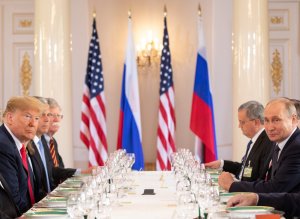 What emerged in Helsinki, in tragic contrast to the historic Reagan-Gorbachev moment Trump was seeking to recreate, was a scene of breathtaking appeasement and submission, writes Marcus Kolga.
What emerged in Helsinki, in tragic contrast to the historic Reagan-Gorbachev moment Trump was seeking to recreate, was a scene of breathtaking appeasement and submission, writes Marcus Kolga.
By Marcus Kolga, July 17, 2018
President Trump has dealt a severe blow to U.S. global influence and the stable international order that relies on American moral leadership.
Where Presidents, throughout history, have used their position to maintain international stability and promote US values of freedom and democracy, Donald Trump has consistently and unapologetically saddled up with dictators whose aim is the exact opposite.
In Helsinki, as in Singapore, the outcome of Trump’s summit has been abject failure. Worse than a lack of progress, it appears that the president is either unwittingly or intentionally facilitating the normalization of these murderously repressive regimes and participating in their efforts to reconfigure world order in their own image.
Like his choice of fashion and style, Trump’s worldview is drifting aimlessly in the Cold War nuclear world of the 1970’s and 80’s while being led by the moral guidance of a cliche Wall Street trader of the same era.
What emerged in Helsinki, in tragic contrast to the historic Reagan-Gorbachev moment Trump was seeking to recreate, was a scene of breathtaking appeasement and submission, rarely witnessed on an international stage.
In the hours leading up to the meeting, Trump blamed his own country for the poor state of Russia-US relations – completely disregarding Russian aggression against Estonia and Georgia; the illegal annexation of Crimea; the ongoing detention and assassination of Russian pro-democracy and human rights activists; the poisoning of critics on foreign soil; the bombing of Syrian civilians; and the meddling and disruption of multiple western referendums and elections, etc.
Never before has a US leader appeared so weak — even questioning the credibility of his own intelligence community about Kremlin meddling in the US elections, in favor of statements made by a corrupt and repressive dictator.
By undermining U.S. global leadership and casting doubts about the cohesion of its alliances, Trump is helping facilitate Vladimir Putin’s goal to reestablish Russian hegemony in Europe by dividing and conquering.
Recent statements by Trump that “NATO is as bad as NAFTA” and that the EU was ‘set up to take advantage of the United States, to attack our piggy bank,’ diminish US credibility, as allies begin to seriously question the status of their relations with the United States.
These concerns were exacerbated in Helsinki, as Trump heaped unwarranted praise on Putin, leading to further speculation about what might have been discussed and potentially agreed to in the one-on-one between the two Presidents.
In Singapore, Trump unilaterally agreed to end U.S. participation in critically important military exercises on the Korean peninsula, leaving South Korea exposed. In the days leading up to the Helsinki summit, Trump signaled his willingness to do the same in the Baltic Sea region — a region that Putin seeks to control and at greatest risk of future Russian aggression. What concessions were agreed to in the one-on-one, are unknown.
We do know that one of the central issues to the ongoing Russia probe, Magnitsky human rights sanctions, were likely discussed. Magnitsky sanctions were the topic of the June 2015 meeting between Kremlin lawyer, Natalya Veselnitskaya, and members of the Trump campaign team, currently being probed by Mueller. The sanctions target many Kremlin officials and Putin associates for their abuse of human rights and corruption, and their removal has been a top priority for Putin since their introduction in 2012.
The leader of the global Magnitsky human rights campaign, Bill Browder, was the subject of a rant by Putin in Helsinki, after he was questioned about Kremlin cooperation in the extradition of 12 Russian intelligence agents indicted last week by the Mueller probe.
While Putin’s rant against Browder underscores the effectiveness of Magnitsky sanctions, there is concern that their removal may have also been a topic — further undermining U.S. moral leadership on human rights. On Tuesday, Russia announced that it is seeking to question current and former U.S. State Department and intelligence agencies about Browder’s activities, in a likely attempt to prosecute and eventually extradite him in efforts to silence Browder and other Putin critics.
If there is a silver lining to be found, it may be that the bond between America’s traditional allies in Canada and Europe is growing stronger because of Donald Trump and the decline of U.S. leadership that he is presiding over. While the dictators and autocrats in Moscow, Damascus, Minsk, Pyongyang, Tehran and beyond rejoice the growing void of global leadership, the western world can only hope that America will return to eventually stand up for the true values, freedom, democracy and human rights, that have made America and the western alliance so strong and stable since the end of WWII.
Marcus Kolga is a specialist on Russian disinformation and foreign policy and is a documentary filmmaker, writer and digital communications strategist. He is a senior fellow at the Macdonald-Laurier Institute’s Centre for Advancing Canada’s Interests Abroad.





